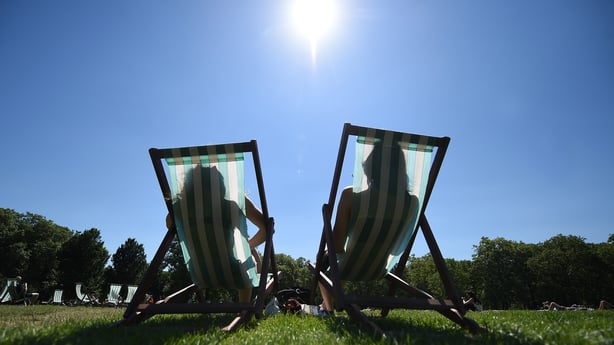Thousands of people took to parks, lakes and beaches across Ireland for the hottest day of the year so far.
The good weather is forecast to continue tomorrow, despite a slight drop in temperatures to a range of 18-23 degrees.
30 degrees was recorded in Mountdillon in Co Roscommon earlier.
The heatwave is due to warm continental air coming from the Sahara desert, with Met Éireann issuing a status yellow high temperature warning that remained in place until 8pm.
Sunny Ireland: The hottest day of the year so far.https://t.co/0pYSTUiDdu
— RTÉ News (@rtenews) July 19, 2016
Meanwhile, people are being advised to swim at beaches that have lifeguards on duty and only swim in their depth.
Irish Water Safety has said a full moon tonight means rip tides will be more frequent.
It says swimmers should also be aware of jellyfish being washed up on beaches - a sting from them can cause anaphylactic shock.
John Leech from Irish Water Safety warned people to exercise caution and only to swim in designated areas.
There are 135 beaches and lakes around the country with lifeguards.
The ESB has also reminded people of the dangers and potential serious consequences of swimming in any ot its reservoirs.
The danger lies in the risk of uneven ground, deep waters, changing water levels and fast-flowing waters.
The ESB says these waters include the reservoirs at Poulaphoca and Golden Falls in Wicklow, Leixlip in Kildare, Inniscarra and Carrigadrohid in Cork, the Ardnacrusha headrace and tailrace canal in Co Clare and Assaroe and Lough Nacung in Co Donegal.
The Irish Cancer Society and the Irish Farmers' Association have joined forces to remind farmers, farm families and outdoor workers of the importance of protecting their skin to reduce the risk of skin cancer.
Skin cancer is one of the most common cancers in Ireland with over 10,000 cases of skin cancer diagnosed every year.
The Irish Cancer Society recommends staying out of the sun when UV rays are at their strongest, generally between 11am and 3pm, covering up by wearing a shirt with a collar and long shorts and wear a hat that gives shade to your face, neck and ears and wear wraparound sunglasses that give UV protection.
It says everyone should use sunscreen with SPF 15 (SPF30 for children) or higher and UVA protection and apply 20 minutes before going outside and re-apply every two hours - more often if swimming or perspiring.
Enjoying the sunshine across the country? Send your sunny snaps to yourphotos@rte.iehttps://t.co/l1KuG8VnRR
— RTÉ News (@rtenews) July 19, 2016
Last month was hottest June on record - US scientists
Last month was the hottest June in modern history, marking the 14th consecutive month that global heat records have been broken, the US National Oceanic and Atmospheric Administration said today.
"The globally averaged temperature over land and ocean surfaces for June 2016 was the highest for the month of June in the NOAA global temperature dataset record, which dates back to 1880," the agency said in a statement.
"This marks the 14th consecutive month the monthly global temperature record has been broken, the longest such streak in the 137-year record."
The report, issued each month by NOAA, also said the global temperature for the first six months of 2016 was the hottest on record.
The combined average temperature over global land and ocean surfaces for June was 0.9 degree Celsius above the 20th century average of 15.5 degrees Celsius.

"June 2016 marks the 40th consecutive June with temperatures at least nominally above the 20th century average," NOAA said.
NOAA also spoke about what it calls the "monthly temperature departure" or record spikes in heat. It said 14 of 15 of these spikes have occurred since February 2015, signalling that global warming is accelerating.
Experts say global warming is at least partially to blame for a number of environmental disasters around the world, from the bleaching of the Great Barrier Reef off Australia to wildfires raging across Canada.
Last year marked the hottest on record, beating 2014, which previously held the title.
With 14 months in a row now setting records for heat, 2016 - now half over - is on track to be another scorching year.

